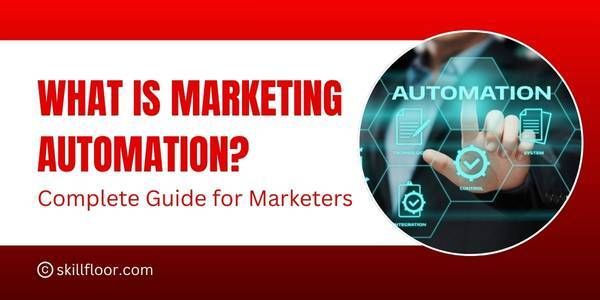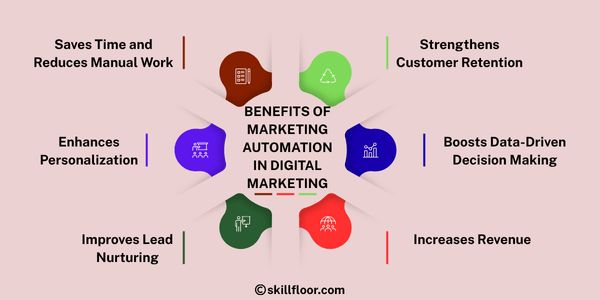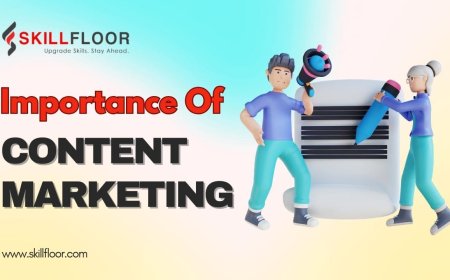What Is Marketing Automation? Complete Guide for Marketers
Understand marketing automation, its role in digital marketing, key benefits, tools, and best practices to scale campaigns efficiently.

Marketing automation has become one of the most transformative innovations in digital marketing, helping businesses save time, personalize communication, and scale without increasing manual effort. Whether you are a beginner or an experienced marketer, understanding how marketing automation works is essential for building efficient, growth-oriented campaigns. In today’s competitive landscape, businesses rely on automation tools to streamline repetitive tasks, analyze customer behavior, and deliver meaningful experiences at the right time.
Marketing automation is not just about reducing human effort. It is about making marketing smarter, faster, and more personalized. According to industry experts, companies using automation experience higher conversion rates and better lead nurturing outcomes. With strong expertise, accurate data, and ethical practices, this blog helps readers understand the real value of automation in modern digital marketing.
What Is Marketing Automation?
Marketing automation is the process of using software tools to automate and optimize marketing activities. These tools help deliver the right message to the right audience at the right time by analyzing user behavior and triggering actions based on predefined rules.
It is widely used across all areas of digital marketing, such as email marketing, social media management, lead nurturing, customer segmentation, and personalized content delivery.
Core Functions of Marketing Automation:
-
Automatically send personalized emails based on customer actions
-
Segment audiences based on interests, behavior, or demographics
-
Trigger workflows when users complete specific actions
-
Score leads to identify high-intent buyers
-
Track customer journeys across multiple channels
-
Provide insights to improve campaign performance
Marketing automation aims to reduce workload, eliminate errors, and increase the effectiveness of digital marketing strategies.
Why Is Marketing Automation Important in Digital Marketing?
In traditional marketing, teams spent hours sending emails, tracking leads manually, and organizing customer data. But today, automation tools handle these repetitive tasks instantly. This shift has transformed the world of digital marketing, making it more efficient, scalable, and customer-focused.
Key Reasons Why Automation Matters:
-
It improves campaign accuracy and reduces human error.
-
It allows marketers to focus on strategy instead of repetitive tasks.
-
It increases speed, allowing campaigns to launch faster.
-
It enhances customer personalization.
-
It provides data insights that help optimize future campaigns.
With automation, digital marketers can manage thousands of customer interactions simultaneously, ensuring smooth delivery and consistent brand communication.
How Marketing Automation Works
Marketing automation uses predefined rules, workflows, and triggers to automate tasks. These systems collect data, analyze behavior, and perform actions based on preset conditions.
Core Components:
1. Workflows
Workflows are automation sequences designed to guide customers through a defined journey. For example, when a user signs up for a newsletter, the workflow may send a welcome email, followed by product recommendations.
2. Triggers
Triggers activate workflows based on user actions like:
-
Clicking a link
-
Adding items to a cart
-
Downloading a PDF
-
Visiting a webpage
3. Customer Segmentation
Automation tools categorize users based on interests, behavior, and demographics. This segmentation is critical for effective digital marketing personalization.
4. Lead Scoring
Lead scoring assigns points to users based on their engagement. Higher scores indicate potential customers who are more likely to convert.
5. Analytics and Reporting
Automation platforms track performance metrics such as:
-
Open rates
-
Click-through rates
-
Conversion data
-
Customer engagement
This helps marketers make data-backed decisions.
Benefits of Marketing Automation in Digital Marketing
Marketing automation offers substantial benefits across digital marketing strategies. It increases efficiency, improves personalization, and ultimately drives revenue growth.
1. Saves Time and Reduces Manual Work
Automation eliminates repetitive tasks, allowing marketers to focus on creativity, strategy, and performance optimization.
2. Enhances Personalization
Automated systems track behavior and deliver content tailored to customer interests, improving engagement and conversions.
3. Improves Lead Nurturing
Automated emails and workflows help guide leads through every stage of the buyer’s journey, increasing the chances of turning prospects into customers.
4. Increases Revenue
Personalization + automation = higher conversions. Research shows that businesses using automation witness significant improvements in sales.
5. Boosts Data-Driven Decision Making
Automation provides detailed analytics, enabling more accurate planning and strategy execution.
6. Strengthens Customer Retention
Automated follow-ups, reminders, and loyalty messaging help businesses maintain long-term customer relationships.

Examples of Marketing Automation in the Real World
Here are common ways businesses use automation in digital marketing:
-
Welcome emails
-
Abandoned cart reminders
-
Birthday offers
-
Product recommendations
2. Social Media Automation
-
Scheduled posts
-
Auto-responders
-
Analytics and engagement tracking
3. CRM and Lead Management
-
Automatic lead scoring
-
Sales notifications
-
Follow-up reminders
4. Customer Journey Automation
-
Personalized landing pages
-
Behavior-based messaging
5. SMS and WhatsApp Automation
-
Order confirmations
-
Delivery updates
-
Promotional messages
These examples show how automation connects multiple touchpoints across the digital marketing ecosystem.
Key Tools Used in Marketing Automation
Marketing automation platforms help streamline processes and deliver measurable results.
Popular Automation Tools Include:
-
Mailchimp
-
ActiveCampaign
-
Marketo
-
Salesforce Marketing Cloud
These platforms offer advanced features for segmentation, workflows, analytics, and more—making them essential for any serious digital marketing strategy.
Challenges of Marketing Automation
Although powerful, automation must be implemented correctly to avoid pitfalls.
Common Challenges:
-
Over-automation can feel impersonal
-
Poor segmentation may reduce results
-
Incorrect workflows can confuse customers
-
Lack of monitoring may lead to errors
-
Initial setup can be time-consuming
With proper planning and continuous optimization, these challenges can be managed effectively.
Best Practices for Using Marketing Automation
To get maximum benefits, follow these best practices:
-
Clearly define your goals
-
Start with simple workflows
-
Use accurate segmentation
-
Monitor performance regularly
-
Maintain consistent brand tone
-
Test and refine workflows
-
Use automation ethically and transparently
-
Combine automation with human creativity
Following these principles helps ensure that automation enhances your digital marketing strategy instead of replacing the human element.
Marketing automation is a game-changer for businesses that rely on digital marketing to reach and engage customers. It helps automate repetitive tasks, personalize communication, and optimize campaigns based on real data. By understanding workflows, segmentation, triggers, and analytics, marketers can build smart systems that save time, improve accuracy, and drive better results. With the right tools and best practices, marketing automation becomes a powerful asset that supports sustainable business growth. As digital marketing continues to evolve, automation will remain one of its most essential technologies. Whether you're a student, professional, or business owner, mastering marketing automation is key to succeeding in today’s fast-moving digital world.






























































